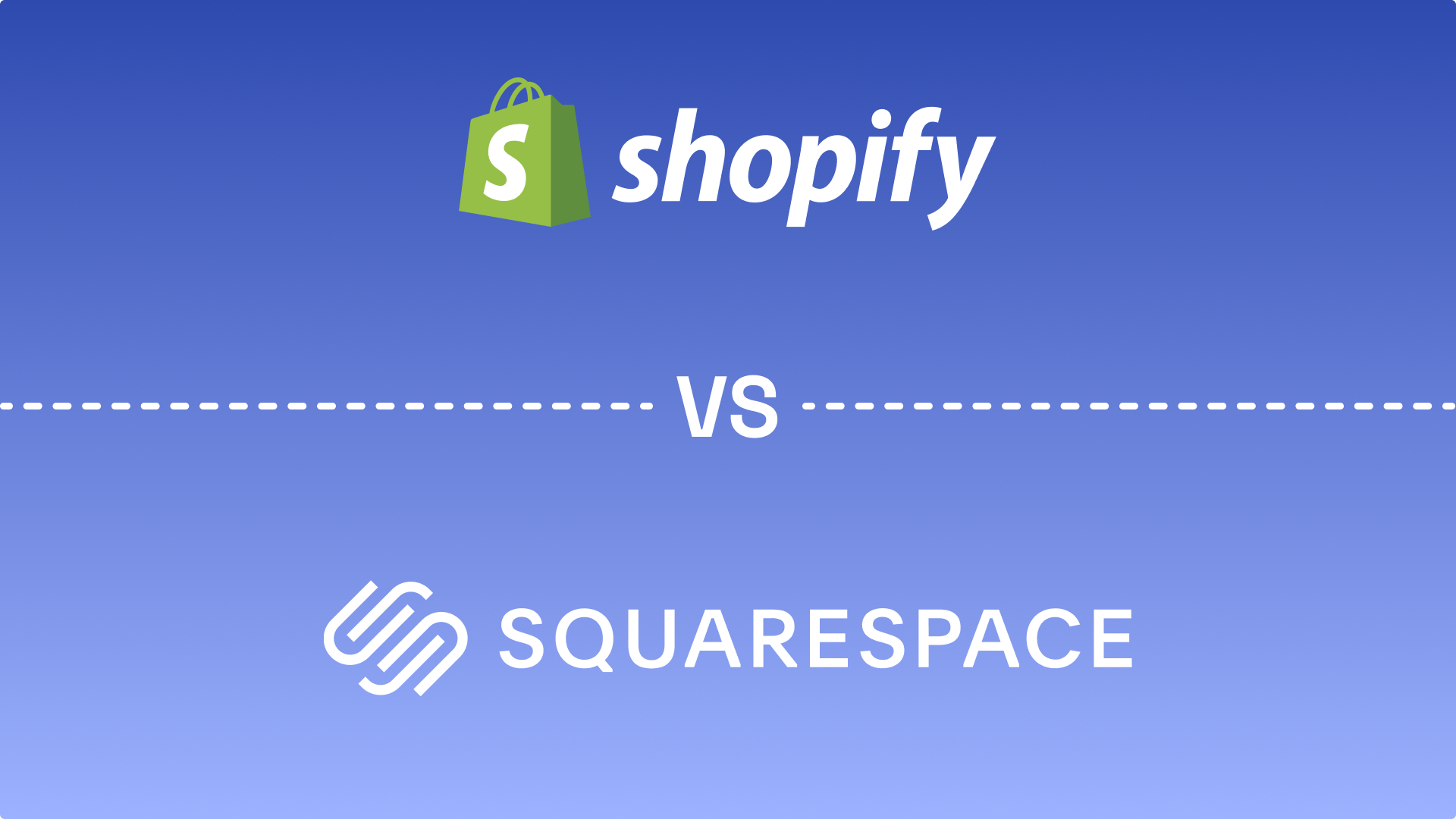Shopify Vs Squarespace: Which is the Most Lucrative for Small Businesses?
- Ecommerce
- Shopify
- Squarespace
Launched
October, 2024

Introduction
Every decision counts when running a business. The smallest decision can have huge consequences, and choosing which platform to sell your services or products online is a chief example of this. Shopify and Squarespace both offer similar services, but there are some key differences between them that may drastically affect their viability depending on your business’s needs.
So, if you want to maximise profits and choose a website builder that’s most conducive to growth, it's integral to make the right choice. Let’s take a look at a head-to-head comparison of Shopify and Squarespace.
UI Design & Customisation
One aspect that most small business owners look for is UI design and customisation. Not only could a clunky platform make creating your website much more difficult if you aren’t a tech wizard, but if you aren’t able to create an effective UI, it can impact sales.
In a study conducted by Forrester Research, a well-designed user interface can boost conversion rates by 200%, and a particularly good user experience (this encompasses UI as well as other factors like website performance, navigation, consistency, and more) can boost conversion rates by 400%.
Out of the two, Shopify is generally considered to offer better UI for e-commerce. It’s simple to set up and offers plenty of customisation tools. However, it can be slightly limiting when it comes to design.
Squarespace is also extremely straightforward to set up, perhaps more so than Shopify considering the extra customisation it offers. Squarespace makes it easy to create beautiful websites, and you can pretty much create any website you can imagine. However, it can be a little more difficult when it comes to the e-commerce side of things. For larger businesses or businesses that want to scale, it might not offer the tools you need.
Scalability
Speaking of scalability; how do Shopify and Squarespace fair when it comes to growing businesses? Shopify is loaded with seemingly endless e-commerce features, with built-in tracking tools, powerful analytic instruments, and well-designed inventory management systems.
It also comes with an ‘app store’, which allows merchants to download apps to customise or optimise different parts of their business. A few examples of this are Wizship, a shipping protection service that gives customers peace of mind, Appstle , an app that allows customers to place recurring orders, and Joy, a loyalty program that allows business owners to reward frequent shoppers.
Squarespace, while not offering as many e-commerce features as Shopify, does give merchants the ability to sell products, accept payments, and manage inventory. Although, as your business grows, you may struggle if you begin to sell hundreds of thousands of products. It also has an extension store, although no way near as robust as Shopify’s.
Let’s take a look at some statistics. According to Shopify, 81% of merchants who stick it out for two years have profitable stores, and the average yearly revenue is £118,400 (this is likely skewed to the higher side thanks to a handful of extremely successful stores).
While there is no comparable data for Squarespace, there is some noteworthy information. According to a meta-study conducted by Gitnux, an average e-commerce website receives around 2,000 visits per month and has a conversion rate of 1.84%
This would equal around 40 sales per month, which, unless you were selling high-ticket products, would be unlikely to match Shopify’s average revenue.
It’s important to keep in mind that these statistical comparisons have little worth because of the vast number of variables at play, but it can be fun to look at the averages.
Regardless, scalability is Shopify’s strength, whereas simplicity and customisation are Squarespace’s.
Pricing & Transaction Fees
Now, let's talk pricing. Both Shopify and Squarespace offer multiple tiers for their services, with Squarespace generally being the cheaper of the two. Here are the prices for the different tiers of both platforms:
Shopify
Starter: £5/mo with a 5% transaction fee.
Basic: £19/mo with a 2% + 25p per transaction fee.
Standard: £49/mo with a 1.7% + 25p per transaction fee.
Advanced: £259/mo with a 1.5% + 25p per transaction fee.
Squarespace
Personal: £12/mo - only able to send invoices.
Business: £17/mo with a 3% transaction fee.
Commerce Basic: £23/mo with a 0% transaction fee.
Commerce Advanced: £35/mo with a 0% transaction fee.
In general, Squarespace offers much more affordable plans and zero transaction fees on their more comprehensive plans, but Shopify offers more e-commerce features to make the investment worth it.
However, for smaller businesses that get less than 100 orders per month and don’t intend to scale, then Squarespace is likely going to be the much more lucrative option.
Marketing Capabilities
Having a great business idea and a well-designed website is amazing, but if no one can find it, it may all be for nothing. Marketing plays a crucial role in your business’s ability to bring in customers, and as such, it’s one of the most important factors you should consider.
Shopify is built with marketing and SEO in mind. Pretty much everything is under your control and can be optimised, allowing you to change meta tags, alt text, URLs, and much more.
Additionally, Its extensive app library features a plethora of incredible marketing tools, ranging from email/SMS conversion boosters like Wizpop to all-in-one SEO packages like Swift.
Squarespace also allows you to tinker with basic SEO variables like meta descriptions and alt text, but it is surface-level compared to Shopify. On top of this, there are both built-in and third-party plugins on offer to help with marketing similar to Shopify, although the list isn’t quite as extensive.
Despite this, there are still more than enough tools on Squarespace to grow your business; you just might want to go with Shopify for that extra edge.
It’s also worth mentioning that there have been some hugely successful companies on both Shopify and Squarespace. Here are a few of the most notable:
Shopify
- Fashion Nova: Modern clothing & accessories.
- Allbirds: Sustainable footwear.
- MVMT: Trendy watches and accessories.
- Gymshark: Fitness apparel.
- Kylie Cosmetics: Beauty products.
Squarespace
- Veuve Clicquot: Luxury champagne.
- Keanu Reeves Arch Motorcycle: High-end motorcycles.
- Designova: Fonts and typefaces.
- Brew Tea Co: Tea brand that offers unique flavours.
These examples show that both platforms offer all the tools you need to grow your business, and the limiting factor will more likely be your knowledge of marketing and SEO.
Customer Support
Finally, let’s talk about customer support. This one is pretty cut and dry; Shopify wins. Shopify is known for its incredible support, having operators available 24/7 with multiple contact points including email, live chat, and phone.
Squarespace also offers good support, but it’s primarily through live chat and email during limited hours. Strangely enough, it doesn’t offer phone support, so this can be a bit of a dealbreaker for some business owners who would like direct assistance.
You’re not going to feel like you're on your own with either platform, but Shopify certainly has the advantage and tends to offer more comprehensive support.
Final Thoughts
Shopify and Squarespace both offer impressive services, and which is best depends on your business model and goals. If you want a platform that is specifically designed for e-commerce and has plenty of tools to help you scale your business, Shopify may provide more long-term value.
Alternatively, if you value simplicity and the ability to customise your website however you want, Squarespace may be the better choice. Between the two, Squarespace is also the more affordable option and can help minimise expenses.
Either can work, and as long as you follow sustainable practices and are able to bring value to customers, your business will excel.
Frequently Asked Questions (FAQs)
Is Squarespace Better Than Shopify?
Shopify is specifically designed to cater to e-commerce merchants, while Squarespace is a general website builder that has some e-commerce functionality. As such, Shopify has more tools and features, but Squarespace offers more freedom and is less expensive.
What Makes Shopify Different From Other Online Stores?
Shopify stands out among other platforms because of its emphasis on functionality. Shopify stores have limited customisation options, but they have access to a wide array of features and tools that help merchants grow their businesses.
Is Shopify POS Better Than Squarespace POS?
Shopify has a more powerful POS system than Squarespace due to the fact that it automatically syncs with stores and has a wide range of features.
Let's build something together
If you like what you saw, let's jump on a quick call and discuss your project

Related posts
Check out some similar posts.

- Shopify
Navigate Shopify's pricing with ease. Discover what each plan offers and choose the best option to g...
Read more
- Shopify
Increase Shopify revenue by raising Average Order Value: five practical tactics that encourage highe...
Read more
- Ecommerce
Boost your e-commerce success with exceptional customer experiences. Discover strategies to build lo...
Read more
- Shopify
Prepare your Shopify store for the holidays with proven tactics to attract shoppers, improve UX, and...
Read more